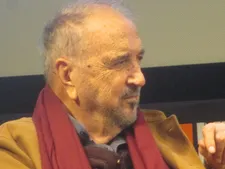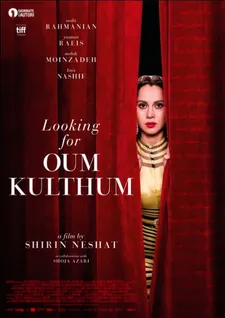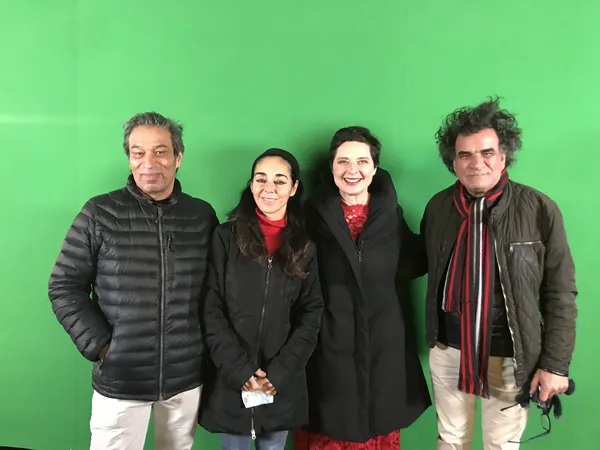 |
| Land of Dreams directors Shoja Azari and Shirin Neshat with Isabella Rossellini and cinematographer Ghasem Ebrahimian Photo: Giulia Theodoli |
Shirin Neshat and Shoja Azari’s highly imaginative Land Of Dreams, based on a story by Shirin Neshat, screenplay by Jean-Claude Carrière and Shoja Azari, shot by Ghasem Ebrahimian, stars Sheila Vand, Matt Dillon, and William Moseley with Isabella Rossellini, Christopher McDonald, Anna Gunn, Joaquim de Almeida, Gaius Charles, Robin Bartlett, James Cady, Nicole Ansari-Cox, Luce Rains, and Rebecca Comerford.
 |
| Shirin Neshat with Anne-Katrin Titze on Land of Dreams: “We started with Jean-Claude Carrière and it was a very complex, unusual script.” |
Land Of Dreams is dedicated to Jean-Claude Carrière. It is his last feature film screenplay credit. Jean-Claude Carrière has three Screenplay Oscar nominations (with Philip Kaufman for The Unbearable Lightness of Being; with Luis Buñuel Cet Obscur Objet Du Désir and Le Charme Discret De La Bourgeoisie, and a Live Action Short win with Pierre Étaix for Heureux Anniversaire). Carrière also co-wrote Volker Schlöndorff’s Oscar winner The Tin Drum and in 2015, received an honorary Oscar. Jean-Claude Carrière died on February 8, 2021 at the age of 89 in Paris.
Shirin Neshat sent me a link to Land Of Dreams before the final cut of the film was locked for the Venice International Film Festival. It is the Orizzonti Opening Night World Premiere, coming up this week. In 2009, Shirin Neshat won the Best Director Silver Lion Award for Women Without Men.
Ed Bahlman had introduced us in 2019 at the Quad Cinema during the Female Filmmakers Festival, founded by Clémence Polès, Mimi Packer and Nathalie Fält, where Shirin moderated The Music Of Regret post-screening discussion with Laurie Simmons.
From New York City, Shirin Neshat joined me on Zoom for an in-depth conversation on Land of Dreams and Jean-Claude Carrière.
Anne-Katrin Titze: Good morning!
Shirin Neshat: How are you!
AKT: Good to see you. You constructed your film Land of Dreams with Jean-Claude Carrière!
SN: The way the story was constructed as six households, they were like six short stories. Each had their own identity, their own focus. We started with Jean-Claude Carrière and it was a very complex, unusual script.
AKT: Tell me a little bit how you met up with the great Jean-Claude Carrière and how the working together developed!
SN: So what happened was, I had known Jean-Claude from earlier years, his wife is Iranian, Nahal Tajadod, who’s an incredible writer. But I had also talked about the [Looking for] Oum Kulthum film that I shot. So we had become friends. When I came up with the idea for Land of Dreams about an Iranian woman, basically an agent collecting people’s dreams, there was a sense of absurdity and humour in this concept.
And I immediately thought, because I really didn’t want us to be the ones writing the first draft of the script, I immediately thought of Jean-Claude because of the nature of the story. The humour, because my past work never had humour. They are stylized but they are never absurd. So I went to Paris and I met him and I described this idea of my interest in an Iranian woman caught up in the American Iranian realities and she’s obsessed with dreams and how she collects them. In fact, I made a video installation in 2019 [at the Gladstone Gallery in New York].
 |
| Mark (William Moseley) with Simin (Sheila Vand) and Alan (Matt Dillon) in Land Of Dreams |
AKT: Right.
SN: And he immediately liked the idea. Because he’s also very politically charged, as you know, with Buñuel, but also always approaching it with a sense of absurdity and humour and sarcasm. He wrote the script, creating the characters of Alan and Mark.
AKT: Okay, those two are fascinating facets of masculinity.
SN: They’re not mine! That was Jean-Claude. For me, you see, it was all about the woman and he said no, we need these two guys, that in a strange way represent aspects of American identity. You know, the super-macho arrogant cowboy, the know-it-all that Americans have as an image. And then this very naïve, sort of romantic dreamer. The two characters were meant to be completely opposite and representing something about what is kind of positive … anyway, it was all very conceptual.
AKT: The two are perfect at that. And the fact that she rejects both! The character of Mark reminded me of a line in a play I had seen a very long time ago. It was The Park by Botho Strauss, his take on A Midsummer Night’s Dream. There was the character of Titania, played by the actress Maria Nicklisch who must have been in her eighties then.
Titania ended up in a supermarket in contemporary surroundings and she walks up to a stranger, a young man, and she tells him “For you I have waited my whole life!” I have never forgotten this absurd strange moment and I thought of it with the character of Mark in your film, when he says “I love you.”
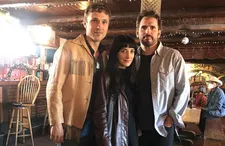 |
| William Moseley. Sheila Vand and Matt Dillon on set for Land Of Dreams Photo: Giulia Theodoli |
SN: I have to say, when I received the first draft of the script - by the way the co-writer of the script is Shoja Azari, who worked extensively on it - but when I read that line, when they just meet and he’s getting out of the car and she says “Why didn’t you really tell me your dream?” And he says “Because I love you,” I immediately thought, oh my god, that is way too much. So I called Shoja, I was just reading it and we were not in the same place. He said “I love it!” I said oh my god, don’t you find it too much? He said, “No, it’s a perfect Jean-Claude.”
I think there are people who react to it, like this guy Mark, he’s too strange. But that is exactly what was intended. None of the characters are believable. Even Simin. They’re a bit exaggerated. He comes across as someone who’s a complete misfit in his community. So he disguises into this idea of romanticism - she is from another country and he is attracted to her exotic background because it makes him think about the outside world, outside of his little sleepy town. Anyway, we kept it. For some people it’s too shocking.
AKT: I think it’s wonderful. That line defines Mark as much as the vest does. I love that you put him in a vest. He is not wearing a jacket or simply a shirt, no, he is walking around the landscape in a vest. There is a pretentiousness about that.
SN: I’m so glad you think that way.
AKT: It’s a character we don’t see too often in films, but who really represents a side of American masculinity very well. The beginning of your film transported me into the land of fairy tales. It is a Snow White moment, but turned on its head. First we see Simin in this position, but then it is the father who awakes. It isn’t Snow White, whose father by the way in the classic tales plays not much of a role.
SN: You know, the film is stylistically a mix of my own artwork video installations, and Jean-Claude’s. I think that the beginning is very much like my own signature as a visual artist. I’ve been obsessed with dreams and actually made several shorts of dreams. We really struggled with that.
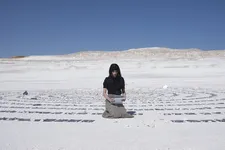 |
| Semin (Sheila Vand): “It was Jean-Claude’s idea that she would absolutely put the photographs on the ground and it’s so much like my work.” |
Some people said it was wrong to start with a dream, especially Simin’s dream. So we took it out, it was much longer. But in the end we brought it back, because it set the mood for the kind of film people are about to see. Because Betty and Bob [Christopher McDonald], the next scene which is the blonde woman [Anna Gunn], the “Marilyn Monroe” one?
AKT: Yes!
SN: That is a very Jean-Claude kind of person. We felt that at the very end of the movie, when she goes to the desert and puts the pictures, we connect the beginning to the end.
AKT: The spiral comes around to the start.
SN: Yes, so I was very happy to have it back, but to be honest, it was out for a long time. A lot of people didn’t understand. Her father was executed, died young, her mother was … I think it’s very important to start with some information about her emotional state
AKT: Yes, because it makes her much more than an agent.
SN: Exactly! And you’ll understand later the whole execution of the father. It just creates a continuity.
AKT: The whole film is partly a resurrection of the father and also of the mother, because you have the beautiful doubling of your actors.
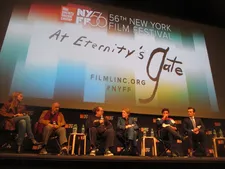 |
| At Eternity's Gate with Louise Kugelberg, Jean-Claude Carrière, Julian Schnabel, Willem Dafoe, Oscar Isaac and Rupert Friend at the 56th New York Film Festival Photo: Anne-Katrin Titze |
SN: Yes, so glad you noticed!
AKT: The mother in the beginning is Isabella Rossellini’s maid and cook later on. Also Betty is Nancy?
SN: Yes, and Bob, Betty’s husband, is also the preacher. And also Joaquim [de Almeida], the husband [Julian] of Isabella Rossellini is also at the trial as Dr. Palmer.
AKT: That’s very David Lynch, Dr. Palmer of all names!
SN: The whole film sort of feels like a dream. It was really important to me and Shoja that nothing really lands in complete reality. Everything is slightly off. I like the ambiguity throughout the film.
AKT: I do, too. And the doubling is something that happens in dreams all the time. Identities aren’t fixed at all. You constantly combine people in dreams. The spiral in the end is such a fantastic image. I particularly like how some of the photos are blown away. They are all blown in one direction, which shows that it’s the wind, that it wasn’t you.
SN: It was the wind.
AKT: There’s nothing artificial, it’s marvellous.
SN: What’s really interesting, it was Jean-Claude’s idea that she would absolutely put the photographs on the ground and it’s so much like my work. For me, what is really interesting is that for a woman that struggled between her Iranian own personal history, and her father’s execution, her whole history of losing the mother - all those photographs are her family photographs. Yet the photographing of American people. The idea of making the spiral with her own family photos and eventually leading to Americans, it really for me culminates about the theme of the film, which is about our humanity.
AKT: Yes.
SN: What she suffers from, what her nightmares are, what haunts her, are really not that different than what Isabella Rossellini, what Jackie [Robin Bartlett], who is worried about being invaded by foreigners, or Betty who’s worried about death or whatever, feel. What I felt strongly about is, in the end her transformation is about her discovery. This is what it’s all about, our fears are common human anxieties and experiences.
And the faces of the people are the testimony of that. This was my hope, that people stay away from the political messages and just come to this note that we are just faces on that landscape that is so vast. And we are little minuscule dots but we’re all there and we’re full of fears.
AKT: And full of dreams, and our dreams are so similar too.
SN: And then we die. And in the end we made the tribute to Jean-Claude who died. That to me was very chilling because we were talking about that and he created this scene. And he’s gone with the wind, you know? I always get tears in my eyes when I see that. It was his creation and his name comes at the end. I was thinking about putting his own picture, of course digitally, because he was alive when we were shooting. Anyway, that was the meaning of the scene for me.
AKT: It’s very powerful to see his name there in the end. Volker Schlöndorff sent me a beautiful tribute when he died about his work with him.
SN: Yes, I know you published it.
AKT: I never got a chance to talk with him [only at the New York Film Festival press conference for At Eternity’s Gate].
SN: He was in New York for a retrospective at MoMA a few years ago.
AKT: Yes, I know. I couldn’t make it then.
Coming up - Shirin Neshat on Matt Dillon and The Ink Spots, Sam Shepard, American iconography, Sheila Vand and the costumes, a peacocking Isabella Rossellini, filming in New Mexico in November 2020, nightingales and Iranian poetry, and the composer Michael Brook.
Land of Dreams World Premiere screening at the Venice International Film Festival is on Thursday, September 2. Expected to attend: Shirin Neshat, Shoja Azari, Sheila Vand, Matt Dillon, William Moseley, Christopher McDonald, and most likely Anna Gunn.











